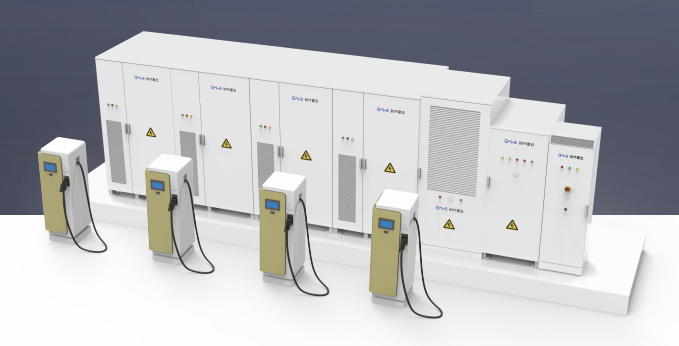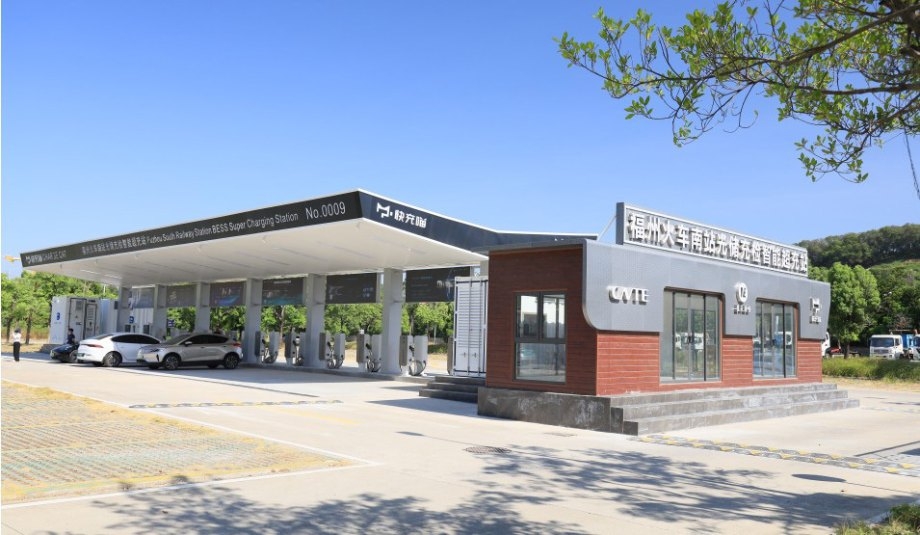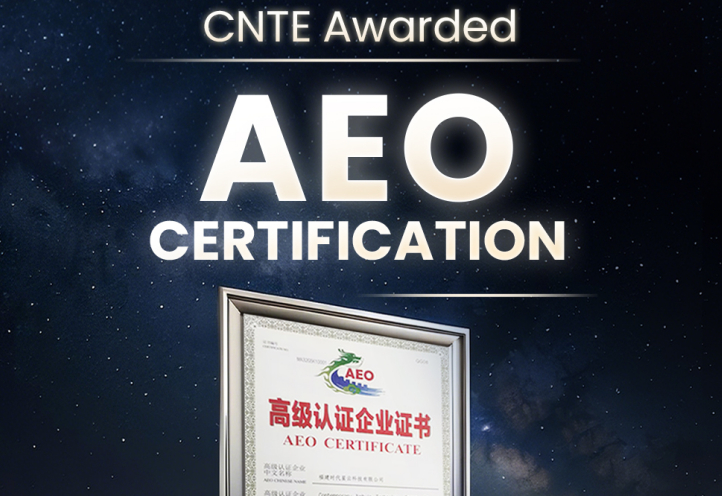Smart Lithium Iron Phosphate (LFP) Battery Charger – BESS EV Charging Station
What is a Smart Lithium Iron Phosphate (LFP) Battery Charger, and why does it matter?
It plays a key role in making Battery Energy Storage Systems (BESS) more efficient. BESS is crucial for EV charging infrastructure. CNTE’s Smart BESS EV Charging Station uses CATL LFP battery cells. It combines EV charging, battery inspection, and energy storage into one system. It is also good for expanding capacity and building new charging stations.

Electric vehicle adoption is growing fast. This rise increases the demand for smarter and more efficient energy management. Without such systems, energy may be wasted, and charging networks may fail to meet demand. The Smart LFP Battery Charger offers a way to fix these problems by ensuring optimal storage and use of energy for EV stations.
The Core Innovation
Unique Features of the Smart LFP Battery Charger
The Smart LFP Battery Charger comes with unique features. It uses CATL LFP battery cells, which are more stable and safer compared to other types. The LFP olivine structure provides strong chemical bonds. This makes the battery resistant to overheating, even at 800°C.
The cells have a stable winding structure. They stay reliable even after long charging cycles. The charger uses materials that are free of metal and carbon particles. This helps reduce risks of damage or failure over time.
Advanced Power Management for Rapid and Safe Charging
The Smart LFP Battery Charger is designed to ensure fast and safe charging for electric vehicles. It delivers a high charging capacity of 180kW, allowing for rapid energy transfer to EV batteries. The system includes key protection features, such as over-current protection, which prevents damage caused by excessive current during charging. It also has external short-circuit protection, which detects and stops any short circuits that could pose safety risks.
Additionally, the charger is equipped with insulation monitoring to detect any electrical leakage and ensure system safety. Equipotential bonding is included to maintain consistent electrical potential across the system, reducing the risk of shocks. An electric shock warning system is also in place to alert users in case of any hazards. These combined features enhance safety during the charging process and protect both the batteries and the charging infrastructure from potential damage.
Modular and Scalable Design for Various BESS Configurations
The charger has a modular and scalable design. This means it can be easily expanded or customized to fit different energy storage needs. It supports flexible capacity expansion. Multiple cabinets can be connected in parallel. This makes it suitable for both small and large charging stations.
Smart Capabilities
Traffic Intelligent Charging System
The charger works with an intelligent traffic charging system. This system helps manage charging based on real-time traffic flow. When demand is high, it adjusts the charging rate to optimize energy use.
Mobile Intelligent Charging Robot
A mobile charging robot is part of the system. It moves to where the charging is needed. This is useful in areas with large parking lots or dynamic vehicle movements. It can charge EVs without requiring a fixed charging station.
Intelligent Energy Storage System
The charger connects to an intelligent energy storage system. This system monitors energy flow and storage levels. It ensures that energy is used efficiently and stored when not needed. This helps reduce energy waste and maintain stable power supply.

Safety and Performance Advantages
Overcharge Protection, Thermal Monitoring, and Short-Circuit Prevention
The Smart LFP Battery Charger includes multiple layers of protection to ensure safe and reliable charging operations. It features overvoltage and undervoltage protection, which safeguards the system by preventing damage caused by voltage fluctuations beyond safe limits. It also incorporates overtemperature and low-temperature protection, ensuring that the charger operates within an optimal temperature range to avoid overheating or freezing conditions.
Additionally, the charger is equipped with overcurrent protection, which prevents excess current from flowing through the system and causing damage. It also provides protection against abnormal communications, monitoring the data exchange between devices to identify and prevent any potential errors or failures. Together, these protective features help prevent accidents, equipment damage, and overheating, ensuring a safe and efficient charging experience.
Improved Battery Lifespan and Reduced Degradation
The charger’s advanced power management reduces battery degradation. Unlike conventional chargers, it monitors charging levels and adjusts them to protect the battery. This extends the lifespan of batteries and lowers replacement costs.
Reliable Performance Under Fluctuating Grid Conditions
The charger is designed to work reliably, even when the power grid experiences fluctuations. It isolates load impacts caused by high-power charging. This protects both the charger and the grid from instability.
EV Charging Applications
Industrial Parks
The Smart LFP Battery Charger is suitable for industrial parks. These areas often have large fleets of EVs, and the charger can support high-capacity charging stations. Its modular design makes it easy to scale up when needed.
Highway Areas
Highway charging stations benefit from the fast-charging capabilities of the Smart LFP Battery Charger. Drivers can quickly charge their vehicles during short stops, ensuring efficient energy use without long delays.
Urban Parks
In urban areas, the charger can support public charging stations. Its compact and scalable design makes it a good fit for busy city centers, where space and energy demand are key concerns.
Environmental and Economic Benefits
Reduction of Energy Wastage Through Optimized Charging Cycles
The Smart LFP Battery Charger reduces energy wastage by optimizing charging cycles. It only delivers the energy needed and prevents overcharging. This ensures that no excess energy is lost during charging.
Lower Operational Costs Compared to Traditional Charging Setups
The charger reduces overall costs in two ways. First, it lowers installation costs by supporting pre-installation in the factory. This simplifies the setup process. Second, its efficient energy use lowers daily operational expenses, making it more economical over time.
Contribution to Clean Energy Transitions
The charger directly integrates with clean energy sources, such as solar or wind. The energy stored in the BESS can be consumed directly by EVs. This reduces dependence on non-renewable energy sources and supports clean energy goals.
Power Your EVs with Smarter Energy
Choose the Smart LFP Battery Charger for safe, fast, and efficient charging. Whether you are upgrading your infrastructure or building new charging stations, this system will help you meet growing energy demands while supporting sustainability. Make the switch today and benefit from reliable performance, reduced costs, and clean energy integration.
Get in Touch
Recent Posts
-

CNTE at KEY ENERGY 2026: Showcases STAR H-PLUS Outdoor Liquid-Cooled Energy Storage System
Mar 05, 2026 -

CNTE Honored as 2025 Forbes China Leading Global Brand
Nov 12, 2025 -

CNTE & YOU.ON Partner to Expand Storage Markets
May 19, 2025 -

CNTE Unveils Energy Storage Lineup at Solartech 2025
May 19, 2025 -

CNTE awarded AEO certification
Mar 14, 2025
Tags
- 500 kw battery
- 500 kwh battery price
- all in one solar battery
- at home battery
- battery based energy storage
- battery capacity for solar system
- battery pack for home solar system
- battery pack kwh
- battery power storage systems
- battery storage applications
- battery storage kwh
- battery storage price per kwh
- battery storage suppliers
- battery storage system design
- battery to grid
- bess battery energy
- bess solar system
- better battery renewable energy
- charging station
- clean energy storage solutions
- commercial solar power battery storage
- cost of solar and battery system
- electrical energy storage exhibition
- energy battery pack
- energy storage battery pack
- energy storage system lithium battery
- energy storage system solar
- energy tech battery
- ess battery price
- ess battery system
- ess solar system
- green energy lithium battery
- high capacity battery for solar panels
- hybrid battery storage
- kwh battery storage
- large solar storage batteries
- largest commercial battery
- latest solar batteries
- lithium battery for off grid solar
- lithium battery for solar system price
- lithium battery home storage
- lithium battery packs for solar panels
- new battery storage
- off grid solar battery storage
- on grid battery
- optical storage integration
- outdoor energy storage
- outdoor solar battery cabinet
- pcs battery system
- power pack energy
- price per kwh battery storage
- q cell battery storage
- smart battery storage
- solar and lithium batteries
- solar battery battery
- solar battery container
- solar battery module
- solar battery storage capacity
- solar battery storage container
- solar battery storage manufacturers
- solar cell storage
- solar energy battery storage capacity
- solar energy battery storage system
- solar energy lithium battery
- solar energy storage system price
- solar energy storage technology
- solar ess system
- solar grid battery
- solar installation battery
- solar one batteries
- Solar panel energy storage systems
- solar panel lithium battery storage
- solar panel power storage system
- solar plant battery
- Solar Power Plant Battery
- solar pv and battery storage systems
- solar pv system with battery storage
- solar storage solutions
- solar with battery system
- solar with lithium battery storage
- standalone energy storage systems
- storage energy battery
- storedge battery
